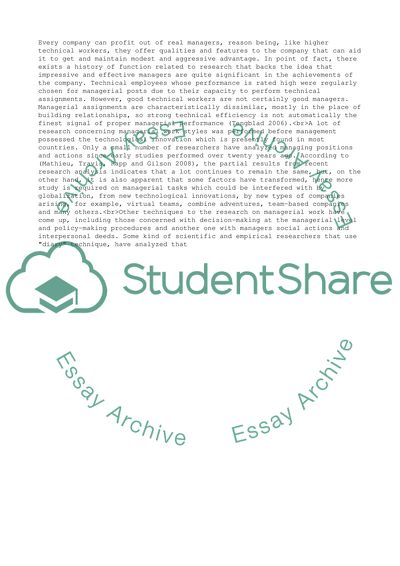Cite this document
(Strengths and Weaknesses of the Research on Managerial Work Essay Example | Topics and Well Written Essays - 2750 words, n.d.)
Strengths and Weaknesses of the Research on Managerial Work Essay Example | Topics and Well Written Essays - 2750 words. https://studentshare.org/management/1855399-with-reference-to-the-readings-discussed-in-the-module-explain-the-strengths-and-weaknesses-of-the-research-on-managerial-work-and-explain-how-research-on-teamwork-should-shape-the-future-of-research-on-managerial-work
Strengths and Weaknesses of the Research on Managerial Work Essay Example | Topics and Well Written Essays - 2750 words. https://studentshare.org/management/1855399-with-reference-to-the-readings-discussed-in-the-module-explain-the-strengths-and-weaknesses-of-the-research-on-managerial-work-and-explain-how-research-on-teamwork-should-shape-the-future-of-research-on-managerial-work
(Strengths and Weaknesses of the Research on Managerial Work Essay Example | Topics and Well Written Essays - 2750 Words)
Strengths and Weaknesses of the Research on Managerial Work Essay Example | Topics and Well Written Essays - 2750 Words. https://studentshare.org/management/1855399-with-reference-to-the-readings-discussed-in-the-module-explain-the-strengths-and-weaknesses-of-the-research-on-managerial-work-and-explain-how-research-on-teamwork-should-shape-the-future-of-research-on-managerial-work.
Strengths and Weaknesses of the Research on Managerial Work Essay Example | Topics and Well Written Essays - 2750 Words. https://studentshare.org/management/1855399-with-reference-to-the-readings-discussed-in-the-module-explain-the-strengths-and-weaknesses-of-the-research-on-managerial-work-and-explain-how-research-on-teamwork-should-shape-the-future-of-research-on-managerial-work.
“Strengths and Weaknesses of the Research on Managerial Work Essay Example | Topics and Well Written Essays - 2750 Words”. https://studentshare.org/management/1855399-with-reference-to-the-readings-discussed-in-the-module-explain-the-strengths-and-weaknesses-of-the-research-on-managerial-work-and-explain-how-research-on-teamwork-should-shape-the-future-of-research-on-managerial-work.


